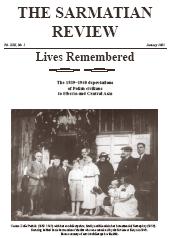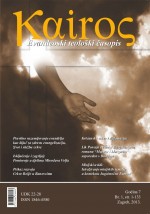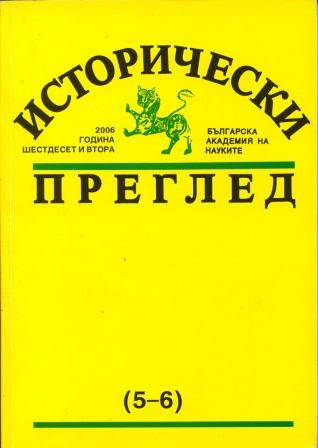We kindly inform you that, as long as the subject affiliation of our 300.000+ articles is in progress, you might get unsufficient or no results on your third level or second level search. In this case, please broaden your search criteria.

This lecture was delivered at Rice University on October 5, 2000. It was sponsored by the Central Europe Workshop.
More...
Her Diary of Deportation, Forced Labor and Death in Kazakhstan: April 13, 1940–May 26, 1941. Translated by Leszek M. Karpinski Edited by John D. L. McIntosh, with assistance from Bogdan Czaykowski and Kenneth Baulk.
More...
By Geraldine Glodek. Iowa City: The Barn Peg Press (www.barnpegpress.com), 1998. 248 pages. Paper. $15.00.
More...

This article seeks to discuss the true biblical meaning of the Gospel message given the fact that in today’s Christianity we have various understandings of the Gospel message. Particularly, this issue is present in the debate about Paul and Jesus – whether Paul’s message about justification by faith or Jesus’ message about the kingdom of God is the Gospel. The thesis of this article is that the Gospel is a primarily christological and not soteriological message. That is, its center is Christ: his person and work, and not humanity and their sins or salvation from sins. There is a huge difference between these two versions of the Gospel message, and they shape church evangelism, life and ministry dramatically. Because of that, this article offers a critique and helpful revision of the understanding of the Gospel message so that rightfully understood it may produce better results and fruits in the life of the church.
More...
The study of the novel The Master and Margarita is focused on the interpretation and the making of a character that Bulgakov created based on the biblical figure. The analytical method used is a comparative one, and the study integrates a deep comparison of the narration techniques and interpretations of the figure in the light of mystic and occult culture. The comparison between the biblical archetype of the character of Pontius Pilate and the re-creation and interpretation of the character in the novel is not just a dry comparison, but it aims to climb over the culture it represents, Christian culture and ethics, regarding the concept of good and evil. As the narrator of the novel changes focus on different subjects, and since the central figure of the storytelling differs, it was more important for us to study the figure of Pontius Pilate than Yeshua (Christ). We have gone deep into his character by analyzing the remorse, the loneliness and the redemption that the character goes through. An important role in the study is that of the symbols interpreted in the novel’s context such as the symbol of the moon, so oft and powerfully used in the novel. Because the author remade a well known character, we think that the author was aware that the reader would have a culture of imagining it, so it was a great challenge for him to give the reader another Pilate. Bulgakov is very talented in the way he describes Pilate so that the reader considering pre-knowledge about the biblical archetype makes an unconscious comparison.
More...
Among contemporary theologians, Miroslav Volf has written extensively on, and probably made the most significant contribution to, the topic of reconciliation. 1 The reason why Volf deserves special consideration is twofold. First, he has developed his theology of reconciliation in a context fraught with disturbing wars, and out of a deep concern for the social and political realities of the day; as such his writings are marked by a profound preoccupation with concrete questions and implications of the Christian faith for the contemporary world. Second, Volf has paid close attention to the biblical text and interacted with it throughout his work; thus, he addresses not only the question of the social meaning of reconciliation from various angles, but he also offers strong, biblical grounds for his theology. Dr. Miroslav Volf is the Henry B. Wright Professor of Theology at Yale Divinity School, and Director of the Yale Center for Faith and Culture. He is an influential Christian theologian, widely known for his works in systematic theology, moral ethics, reconciliation and peacemaking, and for his very active role in promoting a theology of forgiveness, non-violence and unity. Dr. Miroslav Volf was born in Osijek, Croatia and was educated at Evandeoski Teoloski Fakultet, Osijek (BA, summa cum laude); Fuller Theological Seminary (MA, summa cum laude); and University of Tübingen (Dr. theol., summa cum laude, and Dr. theol. habil., both under the supervision of Prof. Jürgen Moltmann).
More...
Our participation in God’s mission to the world is a mandate for all followers of Jesus Christ - however, our understanding of thewhat, why, and how of God’s mission is often viewed through the lens of immediate historical precedent and personal experience. As mission is intrinsically related to how we understand God, who we are as God’s people, and how we think about God’s purposes in our particular contexts, it is therefore important to reflect upon its Biblical, theological, and historical foundations. In light of this, the article will explore the qualitative nature of God’s mission and suggest some ways in which to think about our participation in God’s mission in a Southeastern European context.
More...
This work offers a review of the development of the Pentecostal Church in Banovci nearby Vinkovci, which is part of the Church of God in Croatia, and thus a part of the Church of God globally. The introductory part brings some general features of the beginnings of the Pentecostal movement at the transit from the 19th to the 20th century and it describes the said local community in the environment of the Pentecostal movement. In the middle part the lives and the ministry of two pastors of the church in Banovci are discussed: Paul Weitmann and Veljko Bogdanović. Their contribution is significant not only for the local community in Banovci, but also for the development of the Pentecostal movement in the area of Slavonia and Srijem. The purpose of the work is to contribute to the study of the development of the Pentecostal movement in Croatia.
More...
![Matija Vlačić Ilirik [III]. Zbornik radova](/api/image/getissuecoverimage?id=picture_2013_16338.jpg)

The study of the novel The Master and Margarita is focused on the interpretation and the making of a character that Bulgakov created based on the biblical figure. The analytical method used is a comparative one, and the study integrates a deep comparison of the narration techniques and interpretations of the figure in the light of mystic and occult culture. The comparison between the biblical archetype of the character of Pontius Pilate and the re-creation and interpretation of the character in the novel is not just a dry comparison, but it aims to climb over the culture it represents, Christian culture and ethics, regarding the concept of good and evil. As the narrator of the novel changes focus on different subjects, and since the central figure of the storytelling differs, it was more important for us to study the figure of Pontius Pilate than Yeshua (Christ). We have gone deep into his character by analyzing the remorse, the loneliness and the redemption that the character goes through. An important role in the study is that of the symbols interpreted in the novel’s context such as the symbol of the moon, so oft and powerfully used in the novel. Because the author remade a well known character, we think that the author was aware that the reader would have a culture of imagining it, so it was a great challenge for him to give the reader another Pilate. Bulgakov is very talented in the way he describes Pilate so that the reader considering pre-knowledge about the biblical archetype makes an unconscious comparison.
More...


